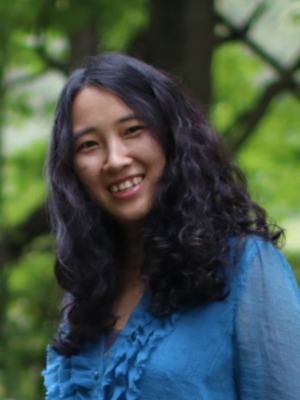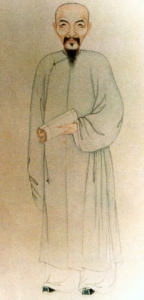Remembering Those Whose Names Are Forgotten
I. Sister Hui
The nun, Sister Hui, was very mysterious.
No one knew her family, or if she had one. No one knew whether she’d been raised rich or poor, educated or uneducated, in a village or in the capital city. “Hui” might not even have been her given name. It could have been only a religious name or nickname. And I had no clue if 慧 was the correct character for her name.
The first time I saw Sister Hui, I was at my grandparents’ house in the village of Sweet Water Well. From the beginning, she impressed me. It is not wholly uncommon for religious people to have a reputation for greed or bad manners or breaking holy rules when they don’t think anyone is looking. Sister Hui was not that sort.
She strictly followed the rules laid out by her order, as well as those that arose from her own sense of decency. She refused, for example, to eat animals. This included candy and cakes made with animal grease. Therefore, the one meal a day that she allowed herself consisted of a few vegetables or fruits. Similarly, she wore no fur or animal hides. She even rejected silk, which some argued as a permissible fabric. She told us that you had to murder a thousand worms just to make a single foot of silk. You could not wholly escape participation in the cycle of life and death, of course. But Sister Hui felt that you could, with effort, dramatically minimize the suffering you inflicted.
Some Buddhists use their religion as an excuse to scrounge for alms. Sister Hui did not. She gave rather than took and always tried to give things of quality. For example, she regularly made offerings of savory, wheat-gluten loaves to the Buddha. This, in and of itself, was not unusual. What was unusual was to make these loaves yourself rather than buying them at the market. This is what Sister Hui did.
“Those market bakers use their dirty feet to knead the dough,” Sister Hui said. “Would Buddha be gladdened by such an offering? I knead loaves by hand.”
One day, a handmaid who worked for my grandparents visited the temple to make an offering of a roll of fine cloth. When she presented it to Sister Hui, Sister Hui examined the cloth for several minutes and then frowned. “This won’t do,” she said. “An offering’s value lies in the spirit in which it’s given and the purity of the gift. Not in the gift’s monetary worth. And this cloth is not yours to give. It was stolen. Its theft, moreover, caused several young servant girls to be beaten. How could it possibly be a fitting gift for the Knower of Worlds?”
Deeply shaken by Sister Hui’s response, the maid confessed all. She said, “There were so many bundles of cloth in that house that I didn’t think anyone would notice one missing. When I found out that the other girls were beaten because of it, I hated myself. I thought that if I made an offering then the Buddha might forgive me.”
Sister Hui pushed the cloth back toward the maid. “What would be ideal is for the Buddha to use divine power to correct your wrong. What would be more ideal is for you to act on Buddha’s behalf and take this action yourself. Put the cloth back. This will restore the girls’ good reputations and your peace of mind.”
This story was passed on to me by one of Sister Hui’s disciples. Years later, when Sister Hui was around eighty, she visited me at my home on her way to Tanzhe Temple to oversee the initiation of a young novitiate. In the course of our conversation, I asked her about the handmaid and the cloth. She shook her head. “That’s a good story,” she said, “with a fine point. But it was made up by those scoundrel disciples of mine. Not a word is true.”
We chatted for a few more minutes, then Sister Hui said she had to hurry off. Before she did though, she asked me to do some calligraphy for her—of fine enough quality that it could be used to make a plaque for her temple.
I agreed and asked her to wait for me while I went to work on the piece in my studio. However, once I was in my studio, I remembered some other tasks that needed to be speedily completed, so I asked my assistant Zhao Chunjian to do the calligraphy and sign my name to it. I thought no one would notice the difference since Zhao Chunjian was quite talented and a good mimic, too. However, when presented with the calligraphy, Sister Hui immediately recognized that the handwriting was not mine.
“I’m sorry,” she said, pressing her palms together. “But I can’t put this on the temple as it is. The calligraphy is very beautiful, but the handwriting is not yours. Please, if it’s not too much trouble, let the one who actually did the calligraphy sign his handiwork with his name. This way Buddha will not be presented with lies.”
When Sister Hui said this, it struck me that her reaction showed a spirit similar to the one illustrated by the story that her disciples had made up. This meant that there was something true in that false story, after all. This, in turn, means that some false stories are truer than others.
This chance meeting with Sister Hui happened many years ago, and I haven’t seen her since. When she recently came to mind, I asked some people from Sweet Water Well about her. No one knew who I was talking about. Her name, whether given or made-up, has been forgotten, as has she. But my story about her remains, and the original story told by her disciples is probably still making the rounds too—even if her name has been swapped for another, and even if she’s been turned from a nun into a monk in that story.
II. Third Master
There is a monk who lives in Jingcheng. He is the third disciple of the abbot of Tianqi Temple. Because he’s the third disciple, and because he’s highly respected, over time he has become known simply as “Third Master,” and his real name has been forgotten.
Many of the abbot’s disciples are indecent. They spend their days trying to raise funds—not for charity but so that they can live luxuriously. Third Master is different. He isn’t full of fake smiles and charming, insincere words like the monks who try to wheedle favors out of temple guests. He isn’t arrogant like the monks whose job it is to chant the rituals. Instead, Third Master is disciplined and avoids any extravagance that might weaken his will. Even if he’s assigned a mission that requires him to travel thousands of li, he’ll walk rather than take a horse. Once, my late brother Qinghu ran into him on the road and could not, no matter how hard he tried, get Third Master to climb onto his carriage.
In keeping with the spirit of the sutras, Third Master doesn’t distinguish between the rich and the poor, or between the politically powerful and the politically weak. When a bureaucrat visits the temple, he receives no special treatment or blessings—even if he donates generously. When the villagers come, Third Master is just as polite to them as he is to the high and mighty and bows to them just as low—even if they donate nothing.
While Third Master is in every way a master, he is not concerned with power or authority, and he teaches as much by his absence as by his presence. Occasionally, he even becomes invisible. For example, there’s a room in which he meditates. Temple visitors sometimes wander into the room and do not see him—although they sense that there’s something holy about the room. A window’s value lies in its transparency and in what one can see through it. So, too, a true master’s.
This is not to say that Third Master doesn’t attract others. He does. But he does so not because he has a superior air, goes out of his way to be charming, not because he’s learned to tell excellent jokes or say profound things, but because he’s reduced himself and gotten rid of anything phony or artificial. Therefore, he has freed himself of all obstructions to his ability to relate to others.
The Taoists and the Buddhists teach that perfection lies in decreasing and simplifying, not in increasing and complicating. It is no surprise then that, while many people remark that Third Master’s character is very good, they have difficulty saying why. If you ask them what it is about him that strikes them as noble, they shake their heads and stay silent.
When I was younger, this puzzled me so much that I once asked my father about it. “Why do people think Third Master is so advanced yet can offer no proof of his superiority?”
My father replied, “Do you really think one has to be able to fly on sticks or float in a wooden cup across the river, like the immortals in the old tales did, to prove they’re enlightened? If so, then you grossly misunderstand what it means to be enlightened.”
The Third Master passed away recently. So perhaps his real name is still remembered by some, unlike Sister Hui’s. I could probably question the students from his hometown and find out his name.
![]()
Ji, Yun. 详注阅微草堂笔记 [Xiang Zhu Yue Wei Cao Tang Bi Ji]. 1798. Shanghai, 上海会文堂
书局 [Shanghai Hui Wen Tang], 1924.
(Ji Yun)
沧州憩水井有老尼,曰慧师父,不知其为名为号,亦不知是此“慧”字否,但相沿呼之云尔。余幼时,尝见其出入外祖张公家。戒律谨严,并糖不食,曰:“糖亦猪脂所点成也。”不衣裘,曰:“寝皮与食肉同也。”不衣绸绢,曰:“一尺之帛,千蚕之命也。”供佛面筋必自制,曰:“市中皆以足踏也。”焚香必敲石取火,曰:“灶火不洁也。”清斋一食,取足自给,不营营募化。外祖家一仆妇,以一布为施。尼熟视识之,曰:“布施须用己财,方为功德。宅中为失此布,笞小婢数人,佛岂受如此物耶?”妇以情告曰:“初谓布有数十疋,未必一一细检,故偶取其一。不料累人受捶楚,日相诅咒,心实不安。故布施求忏罪耳。”尼掷还之曰:“然则何不密送原处,人亦得白,汝亦自安耶!”后妇死数年,其弟子乃泄其事,故人得知之。乾隆甲戌、乙亥间,年已七八十矣,忽过余家,云将诣潭柘寺礼佛,为小尼受戒。余偶话前事,摇首曰:“实无此事,小妖尼饶舌耳。”相与叹其忠厚。临行,索余题佛殿一额。余属赵春涧代书。合掌曰:“谁书即乞题谁名,佛前勿作诳语。”为易赵名,乃持去,后不再来。近问沧州人,无识之者矣。又景城天齐庙一僧,住持果成之第三弟子。士人敬之,无不称曰三师父,遂佚其名。果成弟子颇不肖,多散而托钵四方。惟此僧不坠宗风,无大刹知客市井气,亦无法座禅师骄贵气;戒律精苦,虽千里亦打包徒步,从不乘车马。先兄晴湖尝遇之中途,苦邀同车,终不肯也。官吏至庙,待之礼无加;
田夫、野老至庙,待之礼不减。多布施、少布施、无布施,待之礼如一。禅诵之余,惟端坐一室,入其庙如无人者。其行事如是焉而已。然里之男妇,无不曰三师父道行清高。及问其道行安在,清高安在,则茫然不能应。其所以感动人心,正不知何故矣。尝以问姚安公,公曰:“据尔所见,有不清不高处耶?无不清不高,即清高矣。尔必欲锡飞、杯渡,乃为善知识耶?”此一尼一僧,亦彼法中之独行者矣(三师父涅槃不久,其名当有人知,俟见乡试诸孙辈,使归而询之庙中)。
TRANSLATORS’ STATEMENT
Although celebrated during the Qing dynasty as a brilliant scholar and a beautiful writer, today Ji Yun (1724-1805) is sometimes unfairly dismissed as naively didactic. Therefore, in translating his work, we especially sought to render the spare beauty of his prose, as well as a tone that is everywhere colored by his passionate yet intellectually humble pursuit of “boxue,” the broadening of one’s mind. Key to this was understanding Ji Yun’s individual pieces as manifestations of a greater body of work, and the play of a particular kind of mind—with its own quirky sense of humor and its own flavor of wistfulness. Consequently, we read not only his vast corpus of work, the work that circulated in the literary salons with which he was involved, but also the work of those writers whose styles he said he most admired. This allowed us to simultaneously remain as faithful as we could to his writing while also allowing us to make explicit many implicit matters of cultural subtext and nuance, an essential thing since Ji Yun wrote in classical Chinese. Because it was used exclusively for literary purposes, classical Chinese has a degree of density and suggestiveness that is more commonly found in poetry than in prose. Translating it is a challenging yet richly rewarding task for a writer who loves the ways in which meaning can be multidimensional.
A devotee of all things weird, Yi Izzy Yu teaches Chinese and English studies at Indiana University of Pennsylvania. Her English-language work can be found online at 3:AM Magazine, Strange Horizons: Samovar, DUSIE, and on her Facebook and Instagram pages.
John Yu Branscum teaches creative writing at Indiana University of Pennsylvania and is a curriculum developer for 新东方 in Beijing. His short work has appeared in such journals as Hippocampus Magazine, 3:AM Magazine, Strange Horizons: Samovar, and The Cincinnati Review.
Ji Yun 纪昀 (1724-1805) was an acclaimed Chinese writer and scholar, who served as chief editor of the imperial Four Ways of Knowing Library Project—the largest collection of Chinese writing ever assembled. As chief editor, Ji Yun was charged with censoring texts at odds with the Chinese emperor’s staunchly anti-supernatural sensibilities. In his later years, Ji Yun quietly rebelled against this role by writing the five-volume collection, Notes on the Subtle and the Strange. It includes his memoirs about his personal experiences with the strange and the supernatural. “Remembering Those Whose Names Are Forgotten” comes from this work.







